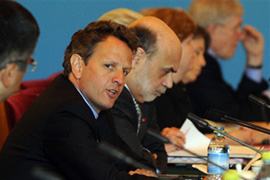China and US discuss economy
Beijing avoids firm commitments on currency reform as officials eye closer co-operation.

The renminbi is the official name of China’s currency, of which the yuan is the base unit.
The world’s biggest and third-biggest economies are seeking to steady relations after a burst of tensions early this year, and while Hu broke no new ground on the currency dispute that has divided them, he set an amicable tone for the two days of talks.
US welcome
Timothy Geithner, the US treasury secretary, appealed to Beijing to work together to reduce trade barriers and develop a more balanced global economy.
He indirectly urged China to ease up on its “indigenous innovation” policies aimed at giving Chinese companies a larger share of new cutting-edge technologies developed in China.
On the yuan, which has been effectively pegged to the dollar since the global financial crisis worsened in mid-2008, Geithner said the Chinese government was moving in the right direction.
 |
| Geithner, left, said a higher yuan exchange rate would work in China’s favour [AFP] |
“We welcome the fact that China’s leaders have recognised that reform of the exchange rate is an important part of their broader reform agenda,” he said.
Geithner tried to send a message to China that yuan appreciation would be in China’s own interest. He said that a more market-driven exchange rate would help suppress inflation while also driving private firms to move up the value chain.
Chinese officials have said they want only “quiet discussion” of US complaints that the Chinese currency is held too low in value, giving Chinese manufacturers an unfair advantage.
Zhang Xiaoqiang, vice-chairman of the National Development and Reform Commission, told a news conference that the euro, not the yuan, had come up for discussion in the opening session of the dialogue. China’s “basic principles” of exchange rate policy were unchanged, he said.
China’s main official newspaper, The People’s Daily, on Monday repeated the government’s position that a rise in the yuan would not help the US economy anyway.
The vows of closer economic co-ordination were partly offset by US secretary of state Hillary Clinton’s effort to coax China into joining international pressure on North Korea after South Korea found it responsible for torpedoing its warship in late March, killing 46 sailors.
China is the sole major backer of North Korea, and has not publicly criticised Pyongyang over the alleged sinking, instead issuing broad calls for restraint. Earlier this month, China hosted the North’s leader, Kim Jong-il, on a visit.
“We must work together to address this challenge and advance our shared objectives for peace and stability on the Korean peninsula,” Clinton told the meeting.
Contentious issues
Tensions flared between Beijing and Washington in the first months of 2010, when China denounced US criticism of its Internet censorship, Washington’s arms sales to Taiwan, and President Barack Obama’s meeting with the Dalai Lama, Tibet’s exiled leader.
China considers Taiwan a part of its territory, and Hu said on Monday that it was important that countries respected one another’s sovereignty.
The Obama administration so far appears willing to go along in the hope a quieter approach will give Beijing more political space to let its currency appreciate.
The annual US trade deficit with China fell to $226.8bn in 2009, down from a record $268bn in 2008. But the Obama administration is keen to lift exports, and the deficit remains a point of friction with Beijing.